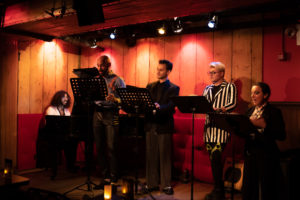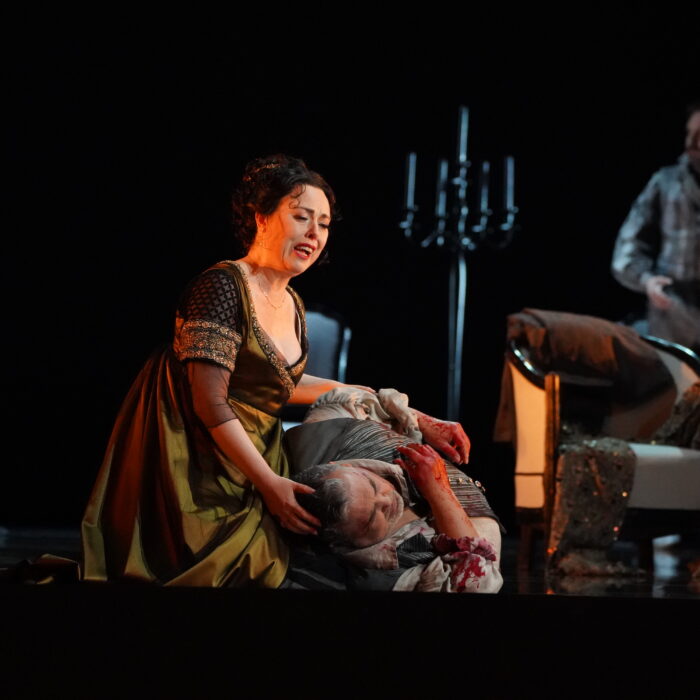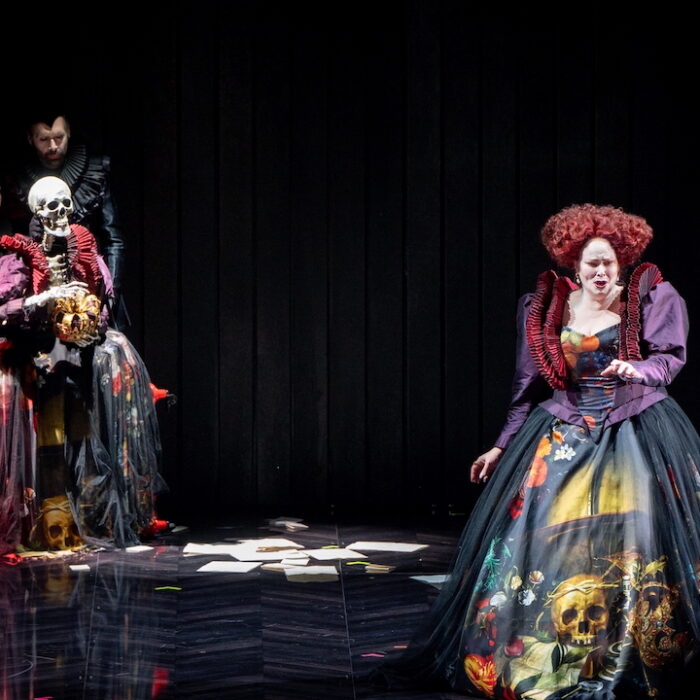
Rockwood Music Hall 2021-22 Review: Felix Jarrar’s ‘Too Hot to Handel’
By Chris RuelPhoto credit: 360 of Opera/Diego Valdez
There are two certainties during the holiday season: Santa and countless performances of Händel’s “Messiah.” The two collided on Saturday, Dec. 11, 2021, when composer and pianist Felix Jarrar brought his subversive rendition of Part one of the baroque masterpiece to Rockwood Music Hall, this on the same day as the infamous bacchanal that is New York’s SantaCon.
After maneuvering around hundreds of stumbling Saint Nicks, I found Jarrar outside the theater, chewing on a pre-performance burger. He hadn’t dressed in red, but in a white shirt with a harness and chains as accouterments. Next to him was the performance’s bass singer Miguel Angel Vasquez, also in a harness, along with black leather pants.
Just as it was no ordinary Saturday in New York, Jarrar’s was no ordinary “Messiah.” It was “Too Hot to Handel.”
Subverting the Traditional
“Too Hot to Handel,” had its debut during the 2020 holiday season, and because of COVID, was performed virtually. This year, Jarrar presented the work in a relaxed, intimate setting where the audience sipped cocktails while hearing a slate of talented young performers rise to the challenge of Handel’s composition.
The composer/pianist likes to subvert the traditional; his opera, “Mother Goose,” is a perfect example. While “Too Hot to Handel” is not close, shock value-wise, to his queer riff on fairy tales, it took a moment to reconcile the sacred text with singers in harnesses, and to me, besides the fun of it all, that was the point. It’s good to be thrown off balance in a way that makes you think about something highly recognizable in an unfamiliar way.
“For me, there is no greater joy than bringing my fellow queer friends and colleagues together to sing and perform music we all grew up knowing and loving,” Jarrar told OperaWire. “I’ve always had a very intense conception of the piece in my head and I love to bring my perspective to it.”
At no time did I feel Jarrar was mocking the sacred nature of the text but extending it beyond hallowed halls, musical and ecclesiastical. As music lovers, we’re used to experiencing the work in a concert hall or church, with performers in tuxes and gowns. Such encounters are lasting as we associate them with the joy of the season, an evening out, or perhaps, the magnificence of performing it alongside hundreds of others in a grand sing-along. It’s all great fun, but staid.
The same adjective doesn’t apply when taking in Part one in an unassuming bar-like setting with your libation of choice within easy reach. I felt closer, emotionally and intellectually, to music I’ve heard countless times. Jarrar’s subversion humanized the event, infusing a playful irreverence, not of the subject, but in the way the audience experienced it.
Hot Highlights
With Jarrar on piano, soprano Zoe Marie Hart, alto James M. Brown, tenor Gabriel Hernandez, and the aforementioned bass, Miguel Angel Vasquez, gave fine performances of Händel’s daunting score. And, yes, like Jarrar and Vasquez, Brown and Hernandez wore their choice of gear.
Jarrar didn’t skip the work’s Overture and played with an intensity that registered on his face. Most of what I’ve heard the young composer perform are his own works, which vary stylistically. It was a treat to hear him handle Handel, executing turns and trills in a sprightly rendition of the oratorio’s opening number.
Overall, at no point in the concert did he fall out of sync with the vocalists or overpower them. He served as an excellent partner not just through his playing, but also in his direction when providing cues for breaths and entrances.
The choruses, which easily could’ve become muddy pits of poorly executed melismas, were kept sharp and tight with clarity between notes and singers. Jarrar’s selection of vocalists produced a well-balanced and pleasing sound when singing as an ensemble.
Vasquez got a workout singing four numbers, the most out of the quartet. It seems a tad cruel of Händel to throw so much ornamented music to the lowest fach, but he did. (“But who may abide the day of His coming,” can be sung by soprano, alto, or bass, and Jarrar opted to give it to Vasquez.) Händel favors the register in Part one, and as challenging as the music is, the oratorio provides a bass showcase before shifting toward the higher registers in Parts two and three. Vasquez’s nicely rounded voice with brassy top notes and a solid foundation served the music well, and he took advantage of the opportunity to show his stuff.
Tenor Gabriel Hernandez kicked off the concert with “Comfort ye my people” and “Ev’ry valley shall be exalted.” Since Händel wrote the bulk of Part one for the bass voice, Hernandez and his fellow higher-ranged singers had lesser solo time. I enjoyed Hernandez’s warm and melodious timbre and his sonority. He had a commanding presence, looking the small audience in the eyes, not over our heads. He used his solo to address the audience directly and lift us into the oratorio’s joyous message.
James M. Brown, who, with a smooth and lyrical alto voice, sang “Behold a virgin shall conceive” and “O thou that tellest good tidings to Zion,” is a vocalist I hope to hear again. Brown’s tone was resonant and full, but with the right balance of delicacy to navigate the baroque style.
Last, and certainly not least, soprano Zoe Marie Hart rounded out Part one with a series of recitatives between the chorus “Glory to God in the highest” and the Part closing duet chorus “His yoke is easy.” The young spinto sparkled, cutting above her counterparts and piano with pleasing squillo during the choruses. The tessitura of the soprano numbers run high and Hart didn’t duck the top notes but embraced them with enthusiasm.
When the time came to sing the Hallelujah chorus, I wondered if the audience was going to join in. With trained singers onstage—along with a few in the audience—the improvised choir sounded pretty good. But even if it were just those of us who relegate singing to cars and showers, and we sounded less-than-stellar, what would it have mattered? The late-afternoon concert was about having fun and spreading joy.
With Santas running amok on the streets of the Lower East Side, and the jubilant music of the season coming to life inside Rockwood Music Hall, the audience welcomed back the magic that is New York City during the holidays with full-throated “hallelujahs!”



